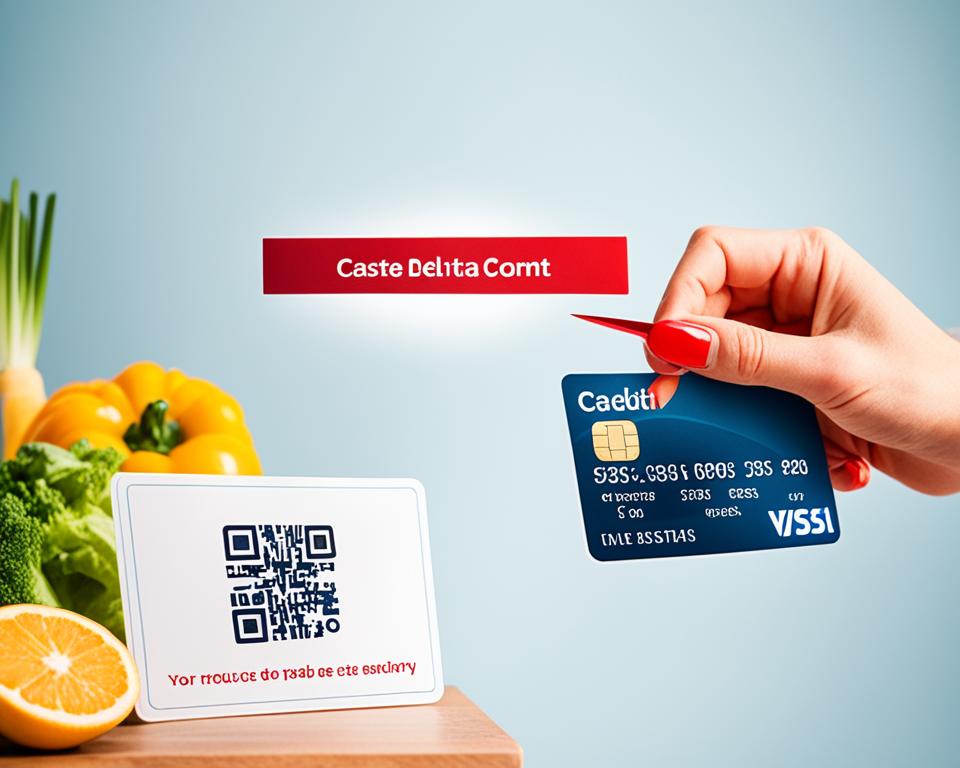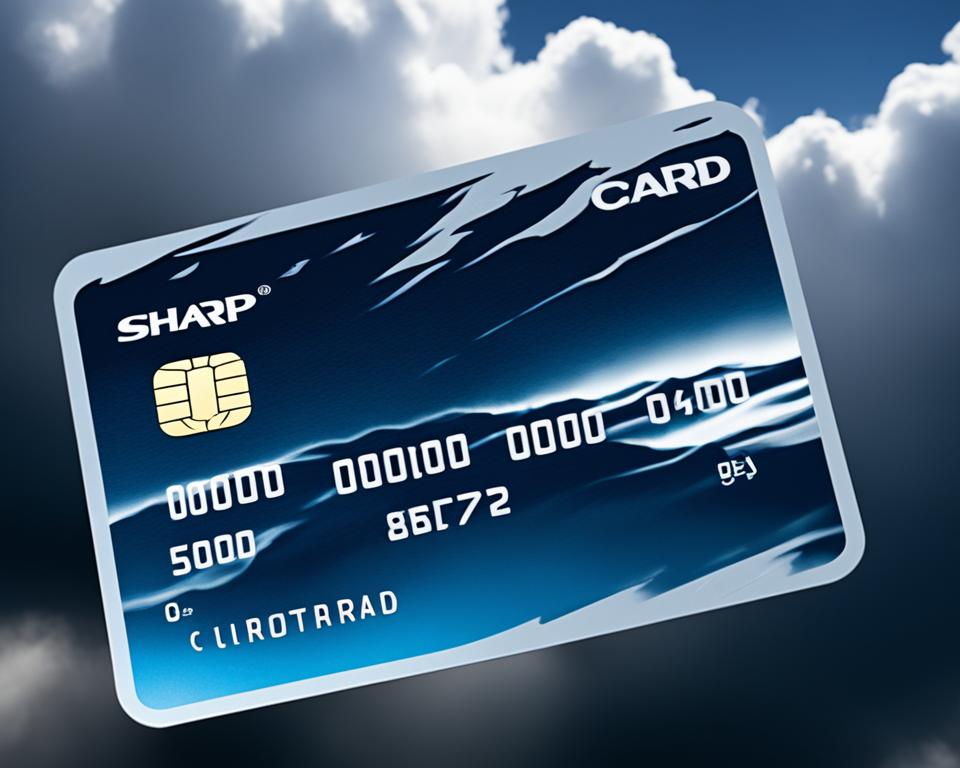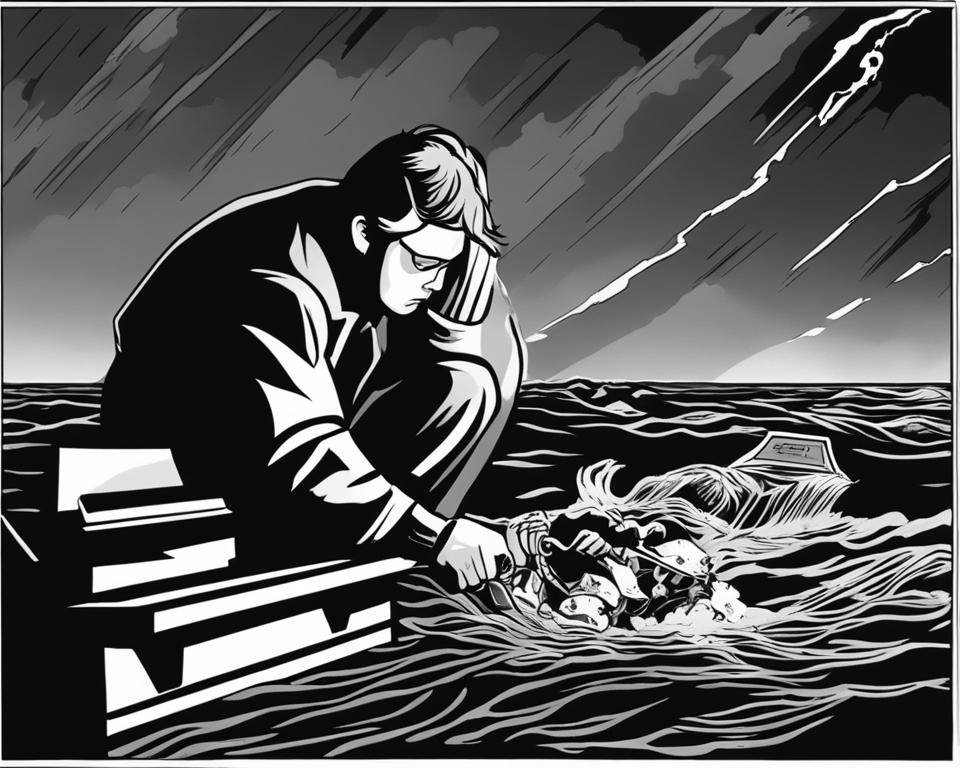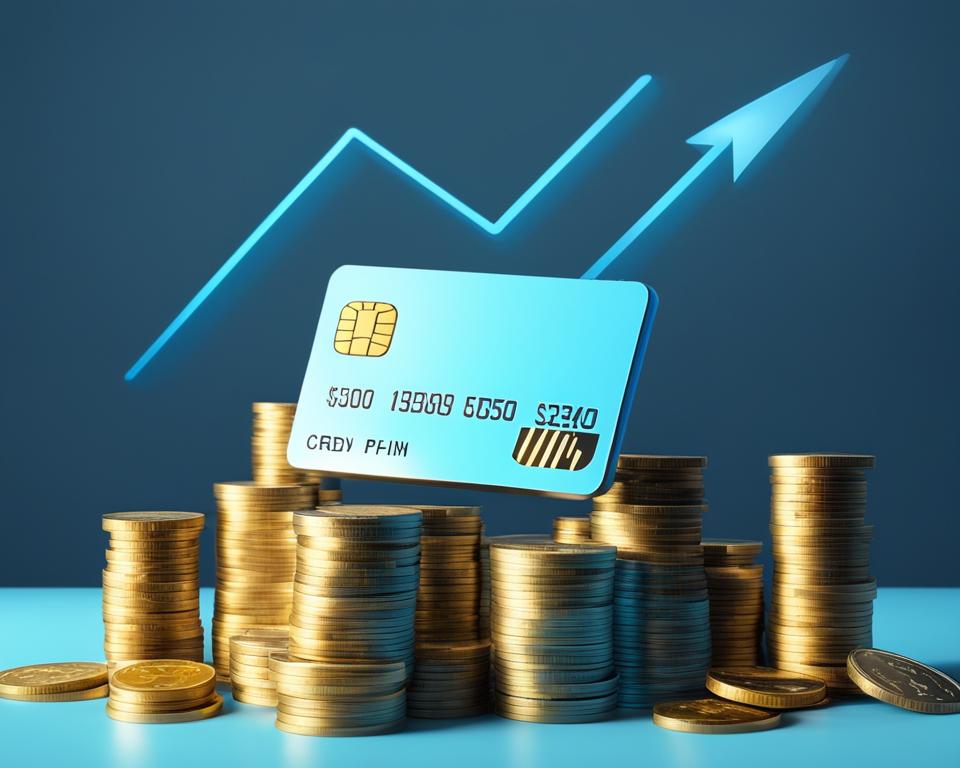When you’re unemployed, managing your money well becomes more important than ever. If you need to use credit cards to cover your bills, there are smart strategies you can implement to minimize debt and fees. This article will provide valuable tips for navigating credit while unemployed.
Key Takeaways:
- Managing credit during unemployment requires careful planning and smart financial strategies.
- Consider applying for a 0% APR credit card to minimize interest charges on new purchases.
- Use credit cards for essential expenses only and cut back on non-essential spending.
- Make timely payments, even if it’s just the minimum amount, to avoid late fees and damage to your credit score.
- Prioritize paying off high APR cards first to reduce interest charges.
Apply for a 0% APR Credit Card
If you anticipate carrying a credit card balance, consider applying for a 0% APR credit card. This type of card offers an introductory period with no interest charges on new purchases. It’s crucial to make at least the minimum payment each month. Look for cards with long intro periods to avoid accumulating high-interest charges. Note that you can qualify for a credit card while unemployed as long as you have some form of income, such as unemployment benefits or a spouse’s income.
When managing credit while unemployed, finding ways to minimize debt and interest charges is crucial. One strategy is applying for a 0% APR credit card. This type of card offers a promotional period during which no interest is charged on new purchases. By taking advantage of this introductory offer, you can avoid adding high-interest charges to your credit card balance.
It is important to keep in mind that even when utilizing a 0% APR credit card, making at least the minimum payment is essential. Failing to make timely payments can result in the termination of the introductory APR and the imposition of high interest rates. Therefore, it is advisable to review the specific terms and conditions of the credit card to understand the duration of the introductory period and the minimum payment requirements.
Qualifying for a credit card while unemployed is possible as long as you have some form of income. This can include unemployment benefits or a spouse’s income. Lenders are typically concerned about your ability to repay the debt, so having a source of income will increase your chances of being approved for a credit card.
In conclusion, applying for a 0% APR credit card can be a beneficial strategy to manage credit card balances while unemployed. By taking advantage of the introductory period with no interest charges, you can minimize debt and focus on regaining financial stability. Remember to make at least the minimum payment each month to ensure you maintain the benefits of the card and avoid incurring interest charges.
Note: The image above is for illustrative purposes only and does not represent a specific credit card offer.
Use Credit Cards for Essentials Only
To minimize credit card debt and reduce expenses, it’s important to use credit cards for essential expenses only. By cutting back on non-essential spending, you can avoid unnecessary debt and make your money last during this challenging time.
Focus on Necessities
During periods of unemployment, it’s crucial to prioritize your spending and focus on necessities. This means cutting back on discretionary expenses such as dining out or subscription services. By avoiding unnecessary purchases, you can redirect your funds towards essential bills and avoid accumulating credit card debt.
Find Low-Cost Alternatives
Instead of engaging in expensive outings, look for low-cost or no-cost activities to replace them. Explore local parks, hiking trails, or community events that offer entertainment at little to no cost. Engaging in affordable activities can help you save money and minimize your reliance on credit cards.
Reduce Grocery Spending
Groceries are a necessary expense, but there are ways to minimize your spending in this area. Look for inexpensive recipes that utilize affordable ingredients. Consider using coupon apps or participating in loyalty programs to save money on groceries. By being mindful of your grocery spending, you can free up more funds for other essential expenses.
| Ways to Minimize Expenses | Impact on Credit Card Debt |
|---|---|
| Cut back on non-essential spending | Reduces the need for credit card usage |
| Find low-cost or no-cost activities | Lowers overall expenses and decreases reliance on credit cards |
| Reduce grocery spending | Saves money in a necessary expense category |

Always Make Timely Payments
Even if you find yourself unable to pay your credit card bill in full, it is crucial to make at least the minimum payment on time to avoid late fees and protect your credit score. Late payments can result in additional charges and negatively impact your financial standing.
If you are facing financial difficulties that prevent you from making the minimum payment, don’t panic. Many card issuers offer hardship programs and payment plan options for individuals facing challenging circumstances. It’s essential to reach out to your card issuer and inquire about these options as soon as possible.
Prioritizing communication with your creditors is vital in preventing further penalties and alleviating your financial burden. By being proactive and seeking assistance when needed, you can navigate through temporary financial setbacks more smoothly.
Benefits of making timely payments
- Minimizing Late Fees: Making your payments on time helps avoid incurring late payment fees, which can add up quickly and burden your financial situation.
- Protecting Credit Score: Consistently making timely payments demonstrates responsible credit management, positively impacting your credit score.
- Preserving Creditworthiness: Maintaining a good credit history is crucial for future borrowing and securing favorable terms on loans or credit cards.
Remember, even during financial hardships, making at least the minimum payment on time can provide significant relief and set you on the path to financial recovery.
| Payment Type | Potential Consequences |
|---|---|
| Missed Payment | Late fees, increased interest rates, damage to credit score |
| Minimum Payment | Prevents late fees and protects credit score |
| Payment Plan or Hardship Program | Flexible options to manage temporary financial difficulties |
Ensure that making at least the minimum payment on your credit card bill becomes a priority, even when you’re facing financial hardships. By doing so, you can minimize fees, avoid credit score damage, and demonstrate your commitment to responsible credit management.
Prioritize High APR Cards
If you have multiple credit cards, it’s crucial to prioritize paying off the ones with higher APRs first. High APRs (Annual Percentage Rates) can significantly increase the cost of your debt over time. By focusing on these cards, you can minimize interest charges and save money in the long run.
To illustrate the importance of prioritizing high APR cards, let’s consider an example:
| Card | Outstanding Balance | APR | Monthly Payment |
|---|---|---|---|
| Card A | $5,000 | 18% | $150 |
| Card B | $3,000 | 24% | $100 |
| Card C | $2,000 | 12% | $75 |
In this example, prioritizing the high APR card (Card B with a 24% APR) would be the most cost-effective strategy. By allocating more funds towards Card B and making minimum payments on the others, you’ll reduce the overall interest charges and pay off the debt faster.
Additionally, you may consider a balance transfer to a card with a lower APR. A balance transfer allows you to move your existing credit card debt to a new card with a lower interest rate, often with a 0% introductory APR for a specified period. This can provide temporary relief from high interest charges and help you pay down your debt faster.
It’s important to carefully review the terms and conditions of balance transfer offers, including any associated fees or limitations. Ensure that the new card offers a lower APR and a suitable repayment plan before proceeding with a balance transfer.
Note: To visualize the significance of prioritizing high APR cards, a graph can be included, showcasing the amount of interest paid over time for different repayment strategies. This visual representation can help readers understand the potential savings and motivate them to take action.

Utilize Credit Card Rewards
If you have rewards credit cards, you can take advantage of the various options available to save on your expenses. By understanding and utilizing credit card rewards, you can maximize their value and reduce your overall credit card bill. Let’s explore some ways to make the most of your credit card rewards.
Earn Cash Back
One popular type of credit card rewards is cash back. With cash back cards, you earn a percentage of your purchases back as a cash reward. Instead of using this cash back to make additional purchases, consider using it as a statement credit towards your credit card bill. Reducing the outstanding balance on your credit card can help you save money by reducing interest charges and overall debt.
Redeem Travel Points
If you have travel rewards credit cards, you can often redeem your points for travel-related expenses. However, during times of unemployment, travel might not be a priority. In such cases, some travel cards offer options to redeem points for gift cards or cash back. Although the redemption value may be slightly reduced, it can still provide financial relief in emergency situations. Always evaluate the value of your points and choose redemption options that align with your current needs.
“By utilizing credit card rewards, you can potentially save on your expenses and lessen the financial burden during periods of unemployment.”
Points Redemption Tips
When redeeming your credit card rewards, keep the following tips in mind:
- Regularly check for reward offers and promotions to maximize the value of your points.
- Compare redemption options to find the most beneficial ones for your current situation.
- Consider redeeming points for essential items or expenses to help reduce your financial strain.
- Always prioritize paying off your credit card balances promptly, especially once you regain employment.
By utilizing your credit card rewards effectively, you can make the most of your credit card benefits and ease your financial situation during unemployment. It’s essential to develop a strategy that aligns with your needs and financial goals.
| Reward Type | Description |
|---|---|
| Cash Back | Earn a percentage of your purchases back as cash rewards |
| Points Redemption | Redeem points for travel, gift cards, or cash back |
| Travel Rewards | Redeem points for flights, hotel stays, or other related expenses |
Remember, credit card rewards should be strategically used to help you navigate your financial situation and minimize debt. However, it’s important to maintain responsible credit card usage and prioritize timely payments to avoid accumulating unnecessary interest and fees.
Register for Unemployment Benefits
If you’re unemployed, registering for unemployment benefits can provide temporary financial support while you search for a new job. To begin the process, you’ll need to file a claim through your state’s unemployment agency. Before doing so, it’s essential to confirm your eligibility for unemployment benefits.
Eligibility requirements vary by state but generally consider factors such as your previous employment history, reason for separation, and the number of hours worked. Make sure you meet the necessary criteria before proceeding with your claim. This information is typically available on your state’s unemployment agency website.
Once you’ve verified your eligibility, it’s time to file a claim. Visit the website of your state’s unemployment agency to access the online application or find instructions on how to file by phone or mail. Be prepared to provide personal details, employment history, and information about your reason for unemployment.
After submitting your claim, it will be reviewed by the state unemployment agency. If approved, you’ll start receiving temporary payments to help cover your living expenses. These payments are typically a percentage of your previous income and are subject to certain limitations, such as maximum benefit amounts and duration.
While receiving unemployment benefits, it’s crucial to fulfill the responsibilities associated with the program. This may include actively seeking employment, participating in job training programs or workshops, and reporting any earnings or job offers you receive during the benefit period. Failure to meet these requirements can result in a loss or reduction of benefits.
Eligibility for Unemployment Benefits
Eligibility for unemployment benefits is determined by your state’s unemployment agency. It typically depends on factors such as:
- Past employment history and earnings
- Reason for unemployment (e.g., layoff, termination, or furlough)
- Availability and ability to work
- Actively seeking full-time employment
- Physical ability to work
Specific eligibility requirements, benefit amounts, and duration vary by state. To determine if you qualify for unemployment benefits in your state, visit the website of your state’s unemployment agency or contact them directly for more information.
Sample Table: Unemployment Benefits Eligibility Comparison by State
| State | Minimum Employment Requirement | Minimum Earnings Requirement | Maximum Benefit Amount | Maximum Benefit Duration |
|---|---|---|---|---|
| California | 12 months | $1,300 in highest quarter | $450 per week | 26 weeks |
| Texas | 12 months | $1,200 total base period wages | $521 per week | 26 weeks |
| New York | 2.5 times weekly benefit rate | 1.5 times weekly benefit rate | $504 per week | 26 weeks |
| Florida | 12 months | At least $3,400 in two quarters | $275 per week | 12 weeks |

Allocate Your Severance Pay
If you receive severance pay when you’re laid off, it’s important to allocate it wisely. Use the lump sum to cover essential bills and expenses until you secure a new job. Creating an emergency fund can provide a financial safety net during this transitional period. Consider putting the money in a savings account and withdrawing only what you need each week or month. By managing your severance pay judiciously, you can ensure it lasts until you regain employment.
If you’re unsure about how to allocate your severance pay, here is a suggested breakdown:
| Allocation | Percentage |
|---|---|
| Essential Bills (Rent, Mortgage, Utilities) | 35% |
| Food and Groceries | 20% |
| Transportation | 15% |
| Healthcare/Insurance | 10% |
| Debt Payments (Credit Cards, Loans) | 10% |
| Emergency Fund | 10% |
By following this allocation plan, you can prioritize your essential needs while also setting aside funds for unexpected emergencies. Remember, it’s crucial to be mindful of your spending habits and utilize your severance pay wisely to maintain financial stability during your job search.
Rework Your Budget
Create or modify your budget to align with your current financial situation. Tracking your monthly expenses and identifying areas where you can cut back or temporarily eliminate spending is a crucial step in managing your finances during unemployment. By reevaluating your budget, you can prioritize essential expenses and make informed decisions about discretionary spending.
Track Your Monthly Expenses
Take the time to review your monthly expenses and categorize them based on their importance. Identify which expenses are necessary for your basic needs, such as housing, food, utilities, and transportation. This step will help you understand where your money is going and where you can potentially reduce spending.
Reduce Discretionary Spending
During periods of unemployment, it’s essential to pause discretionary expenses to conserve your resources. Consider cutting back on non-essential items like dining out, entertainment, or impulse purchases. By being mindful of your spending habits, you can redirect those funds towards essential expenses and increase your financial stability.
Pause Subscriptions
Review your monthly subscriptions and pause or cancel those that are not necessary. This can include streaming services, gym memberships, or subscription boxes. Temporarily suspending these subscriptions can provide immediate relief to your budget and help you allocate those funds towards more critical areas of expenditure.
Focus on Essential Expenses
Reevaluate your financial priorities and shift your focus to essential expenses. Ensure that you have enough money to cover your basic needs, such as housing, utilities, groceries, and healthcare. If necessary, explore alternative options or cost-saving measures for these essential expenses.

Remember, reworking your budget is a temporary measure to manage your finances during unemployment and ensure you can make ends meet. It’s crucial to stay proactive and flexible as you navigate this challenging period. By making thoughtful decisions about your spending and prioritizing essential expenses, you can maintain financial stability until you’re employed again.
Continue Making Minimum Payments
When facing unemployment, it’s essential to stay on top of your financial obligations to minimize the impact on your credit score. Making at least the minimum payment on all your debts should be a priority. By doing so, you can avoid late fees, penalties, and detrimental effects on your creditworthiness.
Prioritize your payments based on their importance and urgency. Essential bills like your mortgage or rent should take precedence to avoid potential consequences like foreclosure or eviction. These are crucial for maintaining stability in your living situation and avoiding further financial stress.
If you anticipate difficulty making a payment, be proactive and reach out to your lenders to discuss your situation. Communication is key to finding solutions that work for both parties. Many lenders are willing to work out payment plans or alternative arrangements to help borrowers during times of financial hardship.
“By making minimum payments on time, you can demonstrate your commitment to meeting your financial obligations and preserve your credit score.”
Remember, even if your payments may be minimal, it’s important to maintain consistency. Falling behind on any outstanding debts can have a lasting impact on your credit score, making it more challenging to secure credit in the future. So, stay diligent and continue making at least the minimum payments to protect your financial well-being.
Tips for Managing Minimum Payments
- Create a budget: Evaluate your income and expenses to determine how much you can allocate towards your minimum payments each month.
- Automate payments: Set up automatic payments to ensure you never miss a due date, reducing the risk of late fees and penalties.
- Consider debt consolidation: If you find it challenging to manage multiple debts, explore debt consolidation options to simplify your payments and potentially lower your interest rates.
By following these tips and making minimum payments consistently, you can navigate the challenges of unemployment while still maintaining good financial standing.
Reach Out to Your Lenders
If you’re facing financial hardship and find it challenging to make timely payments on your loans or bills, it’s important to communicate with your lenders and service providers. Open lines of communication can help you navigate through this challenging period and explore options that can provide temporary relief. By reaching out to your lenders, you can discuss the financial difficulties caused by your job loss and inquire about programs and alternatives that can help ease the burden.
When speaking with your lenders, explain your situation honestly, emphasizing the impact of your job loss on your ability to meet your financial obligations. Be prepared to provide any necessary documentation or evidence of your unemployment, such as termination letters or unemployment benefit statements.
During these discussions, you can explore various options offered by your lenders, including:
- Delayed Bill Due Dates: Inquire whether your lenders are willing to temporarily extend your payment due dates to accommodate your financial situation.
- Lower Payments: Ask if your lenders can lower your monthly payments for a certain period to make them more manageable during this time of financial difficulty.
- Loan Forbearance: Discuss the possibility of entering into a loan forbearance program, which allows you to temporarily pause or reduce your loan payments based on your financial circumstances.
Remember, lenders understand that financial hardships can happen to anyone, and they may be willing to work with you to find a solution that ensures both your financial well-being and their own. By actively communicating with your lenders and exploring these options, you can potentially alleviate some of the immediate financial stress and create a more manageable path forward.
| Lender | Contact Information | Options and Programs |
|---|---|---|
| ABC Bank | Phone: 123-456-7890 Email: info@abcbank.com |
Loan forbearance Delayed bill due dates |
| XYZ Credit Union | Phone: 987-654-3210 Email: support@xyzcreditunion.com |
Lower payments Financial hardship assistance |
| 123 Mortgage Company | Phone: 555-123-4567 Email: customerservice@123mortgage.com |
Payment assistance programs Loan modification |
Case Study: Mary’s Experience with Open Communication
“When I lost my job unexpectedly, I was worried about how I would manage my financial obligations, especially my mortgage payments. I reached out to my mortgage lender and explained my situation. They were understanding and offered me a loan forbearance program, allowing me to pause my payments temporarily until I found new employment. This relief gave me the breathing room I needed to focus on my job search without the constant stress of mortgage payments. Open communication with my lender made a significant difference in my financial stability during that challenging time.”
Consider Debt Consolidation
If managing multiple debts becomes overwhelming, consider debt consolidation. This strategy involves combining all your debts into a single account with a lower interest rate, making it easier to manage and potentially reducing your overall interest costs.
There are two common methods of debt consolidation: balance transfer credit cards and debt consolidation loans. With a balance transfer credit card, you can transfer the balances from your high-interest credit cards onto a single card with a lower or even 0% introductory interest rate. This allows you to consolidate your debts onto one card and save on interest charges while you pay off your balance.
Another option is a debt consolidation loan, which allows you to borrow a sum of money to pay off all your existing debts. This leaves you with a single loan to repay, usually at a lower interest rate than what you were previously paying. By consolidating your debts, you simplify your payment process and have a clearer path towards becoming debt-free.
Benefits of Debt Consolidation:
- Simplify Your Finances: By consolidating your debts, you only have one monthly payment to make instead of juggling multiple due dates and amounts.
- Lower Interest Rate: Debt consolidation allows you to secure a lower interest rate on your total debt, potentially saving you money in the long run.
- Reduced Monthly Payments: Consolidating your debts can result in a lower monthly payment, making it more manageable and easing your financial burden.
- Clear Repayment Plan: With a single loan or credit card, you have a clear repayment plan and can track your progress towards becoming debt-free.
“Debt consolidation can be a smart strategy for individuals with multiple debts, as it simplifies their payment process and often results in lower interest costs,” says financial expert Jane Collins.
However, it’s important to carefully consider your options and thoroughly research the terms and conditions of each debt consolidation method. Assess any associated fees, such as balance transfer fees or origination fees for loans, to determine the most cost-effective solution for your situation.
Remember, debt consolidation alone won’t solve your financial challenges. It’s crucial to address the underlying causes of your debt and adopt responsible spending and budgeting habits to avoid falling back into debt in the future.
Look for Credit Counseling
When facing overwhelming debt and financial uncertainty, seeking help from a reputable credit counseling agency can be a game-changer. Credit counseling offers valuable guidance and support in managing your debts effectively.
One of the key advantages of credit counseling is the ability to negotiate with your creditors on your behalf. These professionals have the expertise to engage in productive discussions with creditors, potentially resulting in lower interest rates, reduced fees, and more favorable repayment terms.
Additionally, credit counselors can assist you in creating a debt management plan (DMP) tailored to your specific financial situation. This plan outlines a structured approach to repay your debts over time, taking into account your income, expenses, and current debt burden.
Lower Interest Rates and Repayment Plans
A primary goal of credit counseling is to secure lower interest rates for your debts. By negotiating with creditors, these agencies may be able to lower your interest rates, making it easier to pay off your debts more quickly.
Furthermore, credit counselors can help you establish a manageable repayment plan within your budget. They can work with your creditors to set up reduced monthly payments or even arrange for consolidated payments on your behalf.
By entering into a DMP with the assistance of a credit counselor, you’ll have a clear path towards debt resolution. This plan helps streamline your payments, reduces stress, and brings structure to your financial journey.
Choosing the Right Credit Counseling Organization
When selecting a credit counseling organization, it’s crucial to choose a reputable and accredited agency. Look for organizations affiliated with recognized industry associations, such as the National Foundation for Credit Counseling (NFCC) or the Financial Counseling Association of America (FCAA).
Before committing to any credit counseling services, research the organization thoroughly. Check for their accreditation, reviews, and customer testimonials. This due diligence will ensure that you’re working with a trustworthy organization that has a proven track record of success.
Remember, credit counseling is a valuable resource in helping you regain control of your financial situation. Take advantage of the expertise and guidance offered by these professionals to navigate the complexities of debt management and improve your financial well-being.
Look for Additional Income Sources
During a period of unemployment, it’s essential to explore opportunities for generating extra income. By seeking out part-time jobs, freelancing gigs, or odd jobs, you can supplement your financial resources and ease the strain on your budget. Consider the following options:
- Part-time jobs: Look for part-time employment opportunities in your area that align with your skills and availability. Whether it’s working in retail, hospitality, or customer service, a part-time job can provide a steady income stream.
- Freelancing: Leverage your skills and expertise by offering freelance services in areas such as writing, graphic design, web development, or consulting. Online platforms like Upwork, FlexJobs, and Fiverr connect freelancers with clients seeking their specific skill set.
- Gig economy: Embrace the gig economy by joining platforms like Uber, Lyft, or DoorDash, where you can earn income through driving or delivery services.
- Odd jobs: Explore opportunities for odd jobs within your network or local community. Whether it’s pet sitting, house cleaning, or yard work, there are often individuals in need of assistance with various tasks.
Remember to prioritize your safety and well-being when considering any income-generating opportunities. Research the legitimacy of the platforms or employers you engage with and be cautious of potential scams.
| Platform | Description |
|---|---|
| Upwork | A global freelancing platform connecting businesses and freelancers in various fields. |
| FlexJobs | A subscription-based job platform specializing in flexible and remote job opportunities. |
| Fiverr | A marketplace for freelancers offering services starting at $5. |
| Indeed | A widely used job search engine that aggregates job listings from various sources. |
Exploring these income sources can not only provide you with the much-needed extra income, but it can also help you expand your skill set and network, potentially opening doors to long-term opportunities. Remember to declare any additional income appropriately for tax purposes and manage your newfound income wisely to secure your financial stability.
Conclusion
Navigating credit while unemployed can be challenging, but with careful planning and smart financial strategies, you can effectively manage your credit and work towards financial stability. By implementing the credit management tips provided in this article, you can minimize debt and make informed decisions to improve your financial situation.
One key factor in handling credit while unemployed is open communication with your creditors. In times of financial hardship, reaching out to your lenders and explaining your situation can help you explore possible solutions, such as payment plans or options for delaying bill due dates. Prioritizing communication can prevent further penalties and alleviate some of the financial stress.
Exploring debt relief options is also an important step in managing credit during unemployment. Consider debt consolidation to simplify your payment process and potentially reduce your overall interest costs. Additionally, seeking assistance from a reputable credit counseling organization can provide valuable guidance and help negotiate lower interest rates or establish a debt management plan.
While navigating credit while unemployed may be challenging, it’s crucial to stay focused on regaining employment. Prioritize your job search and utilize additional income sources, such as part-time jobs or freelancing opportunities, to help meet your financial obligations. By implementing these credit management strategies and maintaining an open line of communication with your creditors, you can work towards your financial stability and regain control over your credit.
FAQ
Can I apply for a credit card while unemployed?
Yes, you can qualify for a credit card while unemployed as long as you have some form of income, such as unemployment benefits or a spouse’s income.
How can I minimize credit card debt while unemployed?
To minimize credit card debt, use your cards for essential expenses only and cut back on non-essential spending. Look for low-cost or no-cost activities to replace expensive outings and reduce your grocery spending by finding inexpensive recipes and using coupon apps.
What should I do if I can’t pay my credit card bill in full?
If you can’t pay your credit card bill in full, make at least the minimum payment on time. Missing payments can result in late fees and damage your credit score. If you are unable to make the minimum payment, contact your card issuer to inquire about hardship programs or payment plan options.
How should I prioritize which credit cards to pay off first?
Prioritize paying off credit cards with higher APRs first to minimize interest charges and reduce the overall cost of debt. Consider transferring balances to a card with a lower APR, especially if you can find a balance transfer offer with a 0% intro APR.
What can I do with credit card rewards while unemployed?
You can utilize your credit card rewards to save money. Cash back rewards can be used as a statement credit, reducing your overall credit card bill. Some travel cards offer options to redeem points for gift cards or cash back, providing relief in an emergency situation. Prioritize paying off credit card balances promptly once you regain employment.
How do I register for unemployment benefits?
You can register for unemployment benefits through your state’s unemployment agency. Confirm your eligibility and file a claim promptly. Once approved, you’ll receive temporary payments to help cover your living expenses until you find a new job.
How should I allocate my severance pay?
Allocate your severance pay wisely. Use it to cover essential bills and expenses until you secure a new job. Consider putting the money in a savings account and withdrawing only what you need each week or month to ensure it lasts until you regain employment.
How can I rework my budget to align with my financial situation?
Create or modify your budget to align with your current financial situation. Track your monthly expenses and identify areas where you can cut back or temporarily eliminate spending. Pause discretionary expenses, such as dining out or subscription services. Look for low-cost alternatives and focus on essential expenses during your unemployment period.
Should I continue making minimum payments on my debts while unemployed?
Yes, it’s important to consistently make at least the minimum payment on all your debts. Prioritize your payments by their importance. Ensure essential bills like mortgage or rent are paid on time to avoid consequences like foreclosure or eviction. If you anticipate difficulty making a payment, proactively contact your lenders to communicate your situation and work out payment plans or alternative arrangements.
What should I do if I’m unable to make payments on time or in full?
If you’re unable to make payments on time or in full, reach out to your lenders and service providers. Inform them about your job loss and resulting financial strain. Inquire about hardship programs or options for delaying bill due dates, lowering payments, or obtaining temporary relief from paying loans. Establishing open lines of communication can help you navigate through this challenging period.
Should I consider debt consolidation while unemployed?
If managing multiple debts becomes overwhelming, consider debt consolidation. This involves combining your debts into a single account with a lower interest rate. Balance transfer credit cards or debt consolidation loans could be suitable options. By consolidating your debts, you can simplify your payment process and potentially reduce your overall interest costs.
How can credit counseling help me manage my debts while unemployed?
Seeking help from a credit counselor can provide valuable guidance in managing your debts. Credit counselors can negotiate with your creditors and assist in creating a debt management plan (DMP). They may be able to lower your interest rates and help you establish a repayment plan. Consider reaching out to a reputable credit counseling organization to explore your options.
Are there opportunities to generate additional income while unemployed?
Yes, you can explore opportunities to generate additional income during your unemployment period. Consider part-time jobs, freelancing, or offering services in the gig economy. Look for odd jobs within your network or community. Online platforms like Upwork, FlexJobs, Fiverr, and Indeed can help you find temporary work or freelance opportunities, providing resources to meet your financial obligations.
What are some strategies for handling credit while unemployed?
Navigating credit while unemployed requires careful planning, communication with creditors, and smart financial strategies. By applying the tips provided in this article, you can manage your credit effectively during unemployment, minimize debt, and work towards your financial stability. Remember to prioritize open communication with lenders, explore debt relief options, and focus on regaining employment to ease your financial situation.





